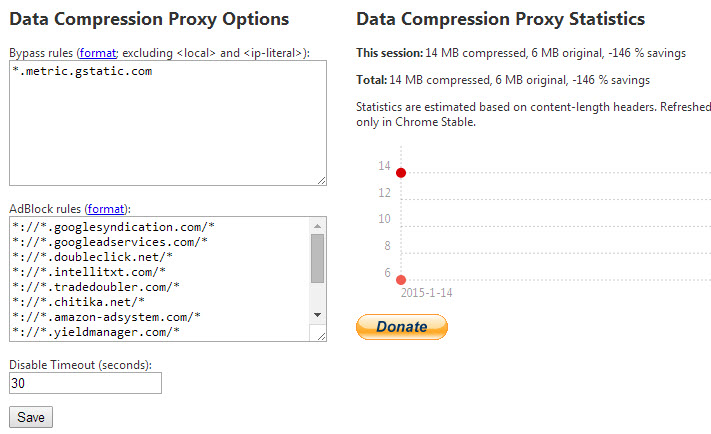Data Compression Proxy update for Chrome introduces whitelist and adblocker
If you are using Google Chrome on Android, you may know that you can enable a data compression proxy to save bandwidth while you are browsing the Internet using the app.
This can be quite useful as it may speed up the loading times of sites you visit thanks to compression, and it may also reduce your monthly bandwidth bill as less data is transferred when the proxy is used.
This proxy is not supported officially on the desktop. While there is certainly less of a need on desktop systems to compress web pages, there are situations where this may speed up browsing as well.
The Data Compression Proxy extension for Chrome introduced support for Google's official compression technology on the desktop.
Introduced in the beginning of 2014, it allowed you to enable or disable the proxy to save bandwidth whenever you felt the need to do so.
The extension was updated recently by its author. The new version introduces several new features that new and future users of it will find useful.
First thing you will notice is that the interface has been improved. It lists all features that the extension supports and also statistics about proxy use.

The new statistics module displays information about compressed and original traffic of the active session and in total, and a graph that highlights savings as well.
This for some reason did not work out too well during initial tests on Chrome Canary running on Windows 7 as more data was transferred while the proxy was active.
It is too early to tell if this is an issue or if this is based on how statistics are processed by the extension, but if you plan to use it, you should keep on eye on the figures to make sure it helps actually.
Two new options are displayed on the same page. The first allows you to add domains (using wildcards) that you want bypassed automatically so that the proxy is not used when connections are established to them.
This can be useful from a privacy or security point of view (since data is routed through Google servers when the proxy is active) but also when you notice that the proxy is not working correctly on a domain.
The second option introduces ad-blocking rules to the extension as well. You can add domains using formatting rules to block connections to select domains.
Both filter lists support wildcards and additional match patterns which you can look up on the Chrome Developer website.
Closing Words
The update introduces two interesting new features to the extension. Data Compression Proxy is mostly useful in low-bandwidth situations and if your data transfer rate is capped and not unlimited.
This article was first seen on ComTek's "TekBits" Technology News

- Log in to post comments